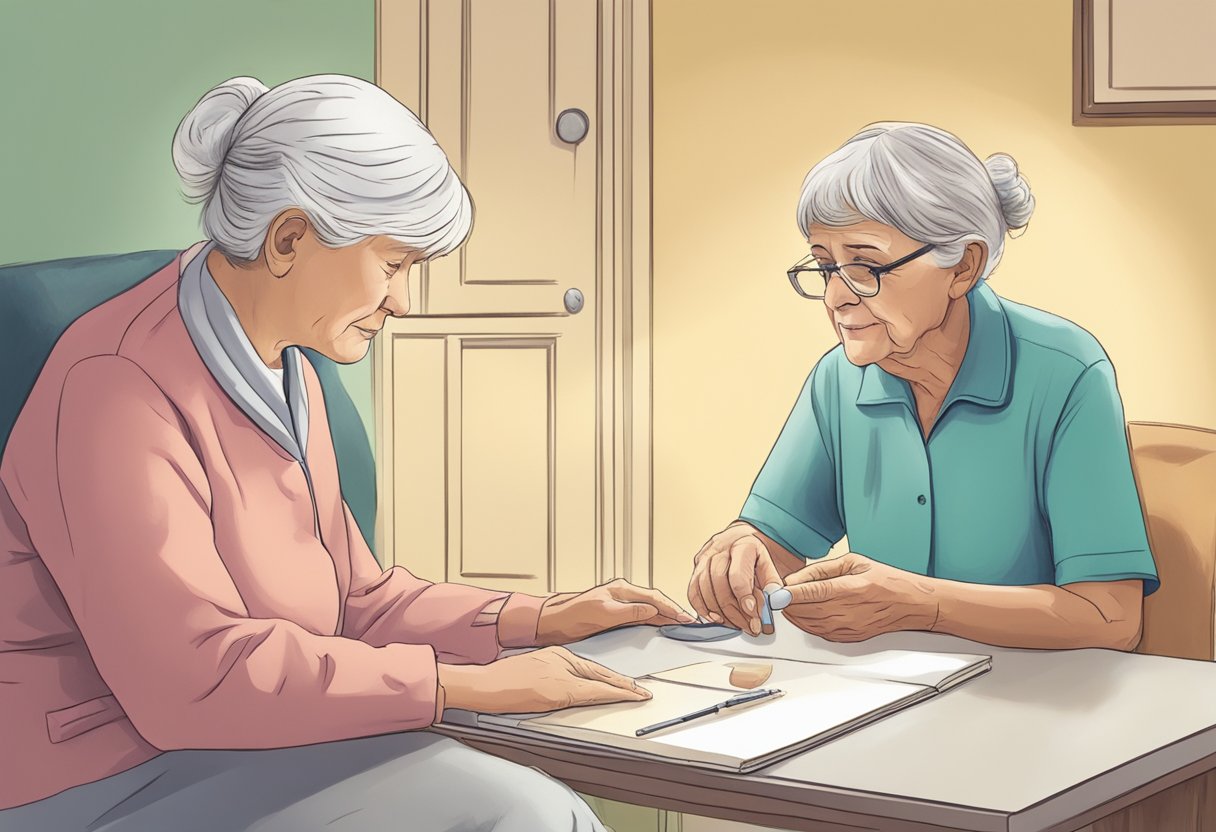Among the elderly, schizophrenia is a complex and debilitating mental disorder that can have a significant impact on their quality of life. According to recent studies, schizophrenia affects approximately 1% of the general population, and the incidence of the disease increases with age.
Schizophrenia is characterized by a range of symptoms, including delusions, hallucinations, disorganized thinking, and abnormal behavior. These symptoms can be particularly challenging for older adults, who may already be dealing with age-related health issues and cognitive decline. Additionally, the stigma associated with mental illness can make it difficult for elderly individuals to seek treatment and support.
Despite the challenges associated with schizophrenia in the elderly population, there is hope for those affected by the disease. Advances in research and treatment have led to new therapies and interventions that can improve outcomes and enhance quality of life. With the right support and care, elderly individuals with schizophrenia can lead fulfilling and meaningful lives.
Understanding Schizophrenia in the Elderly
https://www.youtube.com/watch?v=npNh6VyTskM&embed=true
Definition of Late-Onset Schizophrenia
Late-onset schizophrenia (LOS) is a type of schizophrenia that develops in individuals aged 60 years and above. The onset of the disease is usually gradual and insidious, with symptoms that are similar to those of early-onset schizophrenia (EOS). However, the symptoms of LOS are often less severe than those of EOS.
Difference Between Early-Onset and Late-Onset Schizophrenia
EOS and LOS share many common features, but there are some differences between the two types of schizophrenia. For instance, individuals with EOS tend to have more severe symptoms, including hallucinations and delusions, than those with LOS. In contrast, individuals with LOS often experience negative symptoms, such as apathy, social withdrawal, and lack of motivation.
Common Misconceptions
One common misconception about schizophrenia is that it only affects young people. However, schizophrenia can occur at any age, including in the elderly. Another misconception is that schizophrenia is a rare disease. In fact, schizophrenia affects approximately 1% of the population worldwide, regardless of age.
Correlation Between Age and Schizophrenia
Studies have shown that the incidence of schizophrenia decreases with age. However, the prevalence of schizophrenia in the elderly is increasing due to the aging of the population. Furthermore, the symptoms of schizophrenia in the elderly may be mistaken for symptoms of other diseases such as dementia, making diagnosis and treatment more challenging.
Schizophrenia and Aging
The aging process can exacerbate the symptoms of schizophrenia in the elderly. For example, elderly individuals with schizophrenia may experience cognitive decline, which can lead to memory loss and difficulty with decision-making. Additionally, elderly individuals with schizophrenia are more likely to have comorbid medical conditions such as cardiovascular disease, diabetes, and hypertension.
In summary, schizophrenia can occur at any age, including in the elderly. Individuals with LOS experience symptoms that are similar to those of EOS, but they are often less severe. The incidence of schizophrenia decreases with age, but the prevalence of schizophrenia in the elderly is increasing due to the aging of the population. The aging process can exacerbate the symptoms of schizophrenia in the elderly, making diagnosis and treatment more challenging.
Symptoms and Diagnosis
https://www.youtube.com/watch?v=PURvJV2SMso&embed=true
Common Symptoms
Schizophrenia is a mental disorder that affects a person’s thinking, emotions, and behavior. Among the elderly, schizophrenia can present with a variety of symptoms, including hallucinations, delusions, disorganized speech, and anhedonia. These symptoms can impact a person’s ability to function in everyday life.
Positive and Negative Symptoms
Schizophrenia is often categorized into positive and negative symptoms. Positive symptoms are behaviors or experiences that are added to a person’s normal behavior, such as hallucinations and delusions. Negative symptoms, on the other hand, are behaviors or experiences that are taken away from a person’s normal behavior, such as a lack of emotion or motivation.
Cognitive and Behavioral Symptoms
In addition to positive and negative symptoms, schizophrenia can also present with cognitive and behavioral symptoms. Cognitive symptoms can include difficulty with memory, attention, and decision-making. Behavioral symptoms can include social withdrawal, lack of hygiene, and difficulty with communication.
Diagnosis Process
Diagnosing schizophrenia in the elderly can be challenging because the symptoms can be similar to those of other medical conditions. The diagnosis process typically involves a physical exam, a psychological evaluation, and a review of the person’s medical history. The doctor may also order blood tests or brain imaging to rule out other medical conditions.
Overall, it is important to seek medical attention if you or a loved one is experiencing symptoms of schizophrenia. Early diagnosis and treatment can help improve outcomes and quality of life.
Treatment and Management
Antipsychotic Medication
Antipsychotic medication is commonly used to treat schizophrenia in older adults. However, it is recommended that antipsychotic medications be used in lower doses in older adults due to the increased risk of side effects. Atypical antipsychotics are often preferred over typical antipsychotics due to their lower risk of extrapyramidal symptoms. It is important to note that the use of antipsychotic medication should be balanced with psychosocial interventions.
Cognitive Behavioral Social Skills Training
Cognitive behavioral social skills training is a treatment approach that combines cognitive behavioral therapy with social skills training. This approach has been found to be effective in improving cognitive vulnerabilities and coping skills in older adults with schizophrenia. source
Psychosocial Interventions
Psychosocial interventions are an important component of treatment for older adults with schizophrenia. These interventions can include individual therapy, group therapy, and family therapy. They aim to improve social functioning, reduce stress levels, and improve overall quality of life. source
Creating a Treatment Plan
Creating a treatment plan for older adults with schizophrenia requires a balanced approach that combines antipsychotic medication with psychosocial interventions. The treatment plan should be tailored to the individual and take into account their specific needs and preferences. It is important to regularly assess the effectiveness of the treatment plan and make adjustments as needed.
Challenges and Complications
Schizophrenia is a chronic and severe mental disorder that affects people of all age groups, including the elderly. While the symptoms of schizophrenia can be managed with medication and therapy, there are still many challenges and complications that can arise for older adults with this condition.
Cognitive Decline
Cognitive decline is a common challenge faced by older adults with schizophrenia. This decline can affect memory, attention, and other cognitive functions, making it difficult to perform daily tasks and maintain independence. It is important for healthcare providers to monitor cognitive function in older adults with schizophrenia to ensure that appropriate interventions are implemented to maintain cognitive health.
Comorbidities
Older adults with schizophrenia are at increased risk for comorbidities such as metabolic syndrome, congestive heart failure, chronic obstructive pulmonary disease, and diabetes. These comorbidities can further complicate the management of schizophrenia and require careful monitoring and treatment.
Mental and Physical Health
Older adults with schizophrenia are at increased risk for a range of mental and physical health problems, including falls and extrapyramidal symptoms. These symptoms can be caused by medication side effects and can further complicate the management of schizophrenia. It is important for healthcare providers to monitor mental and physical health in older adults with schizophrenia to ensure that appropriate interventions are implemented to maintain overall health.
Medication Side Effects
Medication side effects are a common challenge faced by older adults with schizophrenia. These side effects can include weight gain, diabetes, and other metabolic problems. It is important for healthcare providers to carefully monitor medication use in older adults with schizophrenia to ensure that the benefits of medication outweigh the risks of side effects.
In conclusion, older adults with schizophrenia face many challenges and complications that require careful monitoring and treatment. By addressing these challenges and complications, healthcare providers can help improve the quality of life for older adults with schizophrenia.
Living with Schizophrenia
Schizophrenia is a chronic, severe mental disorder that affects how a person thinks, feels, and behaves. Among the elderly, schizophrenia can be particularly challenging to manage. However, with the right support and treatment, many people with schizophrenia can lead fulfilling lives.
Quality of Life
Schizophrenia can have a significant impact on a person’s quality of life. It can affect their ability to work, socialize, and take care of themselves. Symptoms such as delusions and hallucinations can be distressing and disruptive. However, with the right treatment, many people with schizophrenia can experience sustained remission of symptoms, which can greatly improve their quality of life.
Support Systems
Having a strong support system is crucial for people with schizophrenia. This can include family members, friends, mental health professionals, and support groups. Support systems can provide emotional support, practical assistance, and help with managing symptoms and medications.
Work and Daily Functioning
Schizophrenia can make it challenging to work and perform daily activities. However, with the right treatment and support, many people with schizophrenia are able to work and live independently. It is important for people with schizophrenia to find work that is meaningful and suits their abilities, and to have accommodations if necessary.
Recovery and Remission
Recovery and sustained remission of symptoms are possible for many people with schizophrenia. Treatment options include antipsychotic medications, psychotherapy, and support groups. It is important for people with schizophrenia to work closely with their mental health professionals to find the right treatment plan for them.
Overall, living with schizophrenia can be challenging, but with the right support and treatment, many people with schizophrenia are able to lead fulfilling lives.
Research and Future Directions
Current Research
Current research on schizophrenia in the elderly has focused on understanding the unique challenges faced by this population. One study found that older adults with schizophrenia are at increased risk for physical health problems such as diabetes, hypertension, and cardiovascular disease [1]. Another study found that cognitive impairment is a common symptom in elderly patients with schizophrenia [2].
Researchers are also exploring the effectiveness of different treatments for elderly patients with schizophrenia. A recent meta-analysis found that antipsychotic medications can be effective in reducing symptoms in this population, but that they may also increase the risk of adverse events such as falls and cognitive impairment [3].
Future Treatments
Future treatments for schizophrenia in the elderly may focus on reducing the risk of adverse events associated with antipsychotic medications. One promising area of research is the use of non-pharmacological treatments such as cognitive-behavioral therapy and psychosocial interventions [4]. These treatments have been shown to be effective in reducing symptoms and improving quality of life in elderly patients with schizophrenia.
Another area of research is the development of new medications that are specifically designed for elderly patients with schizophrenia. These medications may have fewer side effects and be better tolerated than traditional antipsychotic medications [5].
Public Health and Policy
Public health and policy interventions may play an important role in improving the care of elderly patients with schizophrenia. One study found that access to mental health services is limited for elderly patients with schizophrenia, and that this population is often underserved [6].
Policy interventions such as increased funding for mental health services and improved training for healthcare providers may help to improve the care of elderly patients with schizophrenia. Additionally, public health interventions such as programs to promote healthy lifestyle behaviors may help to reduce the risk of physical health problems in this population [7].
In conclusion, current research on schizophrenia in the elderly is focused on understanding the unique challenges faced by this population and developing effective treatments. Future treatments may focus on reducing the risk of adverse events associated with antipsychotic medications and developing new medications specifically designed for elderly patients with schizophrenia. Public health and policy interventions may also play an important role in improving the care of this population.
[1] https://www.ncbi.nlm.nih.gov/pmc/articles/PMC3181756/
[2] https://pubmed.ncbi.nlm.nih.gov/33534420/
[3] https://www.ncbi.nlm.nih.gov/pmc/articles/PMC3756792/
[4] https://www.ncbi.nlm.nih.gov/pmc/articles/PMC3181756/
[5] https://www.ncbi.nlm.nih.gov/pmc/articles/PMC3756792/
[6] https://pubmed.ncbi.nlm.nih.gov/33534420/
[7] https://www.ncbi.nlm.nih.gov/pmc/articles/PMC3181756/



